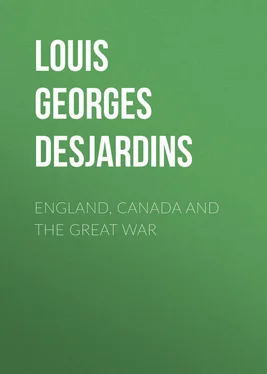Louis Desjardins - England, Canada and the Great War
Здесь есть возможность читать онлайн «Louis Desjardins - England, Canada and the Great War» — ознакомительный отрывок электронной книги совершенно бесплатно, а после прочтения отрывка купить полную версию. В некоторых случаях можно слушать аудио, скачать через торрент в формате fb2 и присутствует краткое содержание. Жанр: foreign_antique, foreign_prose, на английском языке. Описание произведения, (предисловие) а так же отзывы посетителей доступны на портале библиотеки ЛибКат.
- Название:England, Canada and the Great War
- Автор:
- Жанр:
- Год:неизвестен
- ISBN:нет данных
- Рейтинг книги:5 / 5. Голосов: 1
-
Избранное:Добавить в избранное
- Отзывы:
-
Ваша оценка:
- 100
- 1
- 2
- 3
- 4
- 5
England, Canada and the Great War: краткое содержание, описание и аннотация
Предлагаем к чтению аннотацию, описание, краткое содержание или предисловие (зависит от того, что написал сам автор книги «England, Canada and the Great War»). Если вы не нашли необходимую информацию о книге — напишите в комментариях, мы постараемся отыскать её.
England, Canada and the Great War — читать онлайн ознакомительный отрывок
Ниже представлен текст книги, разбитый по страницам. Система сохранения места последней прочитанной страницы, позволяет с удобством читать онлайн бесплатно книгу «England, Canada and the Great War», без необходимости каждый раз заново искать на чём Вы остановились. Поставьте закладку, и сможете в любой момент перейти на страницу, на которой закончили чтение.
Интервал:
Закладка:
All my life a close student of History, I was much impressed by the constant Policy of England to maintain Peace during the last century. When the World emerged from the great wars of the Napoleonic Era, she firmly took her stand in favour of peaceful relations between the nations, trusting more and more for the future prosperity of them all to the advantages to be derived from the permanency of friendly intercourse, from the ever increasing development of international trade, prompted by the freest possible exchanges of the products of all the countries blessed by Providence with large and varied resources. Her statesmen, so many of them truly worthy of this name, however divided they may have been with regard to questions of domestic government and internal reforms, were most united about the course to be followed respecting foreign relations. Perhaps more than all others having a say in the management of the world's affairs at large, they fully realized that no nation could prosper and successfully work out her destinies by systematically trying to injure her neighbours. No independent country can become wealthier, happier, and greater, by spreading ruin and devastation around her frontiers.
The most convincing evidence that England was constantly favourable to the maintenance of peace amongst the great Powers of the World, for the last hundred years, is found in her permanent determination not to be drawn into the vortex of European continental militarism, so powerfully developed by Prussianism. She could have organized a standing army of millions of men. She would not. True, during the few years which preceded the present hurricane, some of the most eminent of England's military officers, notably, foremost amongst them, Lord Roberts, seeing, with their eyes wide open, the aggravated dangers accumulating on the darkening horizon, warned their countrymen about the threatening waves which menaced the future of the world. But British public opinion, as a whole, would not depart from her almost traditional policy of " non-intervention ". For nearly a century, Great Britain maintained her " splendid isolation ", trusting to the sound sense which should always govern the world to protect Mankind against the horrors of a general war. Never was this great national policy better exemplified than during the long and glorious reign of Her Majesty Queen Victoria. For more than fifty years, she graced one of the most illustrious Thrones that ever presided over the destinies of a great Empire, with sovereign dignity, with womanly virtues, with motherly devotion, with patriotic respect of the constitutional liberties of her free subjects. When she departed for a better world, she was succeeded by the great King and Emperor – Edward VII. – who, during the few years of his memorable reign, proved himself so much the friendly supporter of harmony and good will amongst the nations that he deserved to be called "The King of the Peace of the World."
CHAPTER II.
The Persistent Efforts of England in Favour of Peace
In 1891, Lord Salisbury, then Prime Minister of England, witnessing the constant progress of Prussian militarism on land and sea, and fully conscious of the misfortunes it was preparing for Humanity, ordered an official statement to be made of the extravagant cost of the European military organization, and sent it confidentially to the German Kaiser, who took no notice of it.
In 1896, Lord Salisbury lays before the Czar of Russia all the information he has obtained on the question of militarism in Europe. On the 28th of August, 1898, the Emperor of Russia addressed to the world his celebrated Manifesto in favour of peace. It urged, first, the necessity of a truly permanent peace; second, the limitation of military preparation which, in its ever increasing development, was causing the economic ruin of the nations.
The conferences of The Hague in favour of an international agreement for the maintenance of peace were the direct result of the initiative of the British Prime Minister, who foresaw the frightful consequences for Humanity of the enormous development of militarism by the German Empire.
All the great Powers of Europe and America, together with the secondary states, at once heartily concurred with the proposition of the Czar of Russia. Unfortunately, there were two sad exceptions to the consent to consider the salutary purpose so anxiously desired by those who valued as they should all the benefits the world would have derived from an international system assuring permanent peace. Germany and Austria, the latter already for years dominated by the former, opposed the patriotic move of the Emperor of Russia, suggested to him by Great Britain. They agreed to be represented at the Conferences for the only object of thwarting the efforts in favour of a satisfactory enactment of new rules of International Law to henceforth protect the world against a general conflagration, and to free the nations from the crushing burdens of a militarism daily developing more extravagant.
Ministerial changes in Great Britain in no way altered this part of the foreign policy of the Mother Country. In 1905, Mr. Campbell-Bannerman became Prime Minister of England. He was well known to be an ardent pacifist. Deprecating the mad increase of unchecked militarism, he said, in his ministerial program: —
" A policy of huge armaments keeps alive and stimulates and feeds the belief that force is the best, if not the only, solution of international differences. "
On the 8th of March, 1906, Lord Haldane, then Minister of War, declared in the British House of Commons: —
" I wish we were near the time when the nations would consider together the reduction of armaments… Only by united action can we get rid of the burden which is pressing so heavily on all civilized nations. "
The second Conference of The Hague which took place in July and October, 1907, was then being organized. Russia was again its official promoter. Well aware of the uncompromising stand of Germany on the question of reduced armaments, she had not included that matter in the program she had decided to lay before the Conference. The British Government did all they could to have it placed on the orders to be taken into consideration. A member of the Labor Party, Mr. Vivian, moved in the House of Commons, that the Conference of The Hague be called upon to discuss that most important subject. His motion was unanimously and enthusiastically carried.
Informing the House that the Cabinet heartily approved the Resolution, Sir Edward Grey, Secretary for Foreign Affairs, said: —
" I do not believe that at any time has the conscious public opinion in the various countries of Europe set more strongly in the direction of peace than at the present time, and yet the burden of military and naval expenditure goes on increasing. No greater service could it (the Hague Conference) do, than to make the conditions of peace less expensive than they are at the present time… It is said we are waiting upon foreign nations in order to reduce our expenditure. As a matter of fact, we are all waiting on each other. Some day or other somebody must take the first step… I do, on behalf of the Government, not only accept, but welcome such a resolution as this as a wholesome and beneficial expression of opinion. "
In July, 1906, a most important meeting of the Inter-Parliamentary Union took place in London. Twenty-three countries, enjoying the privileges, in various proportions, of free institutions, were represented at this memorable Congress of Nations. In the course of his remarkable opening speech of the first sitting, Mr. Campbell-Bannerman, Prime Minister, said: —
" Urge your Governments, in the name of humanity, to go into The Hague Conference as we ourselves hope to go, pledged to diminished charges in respect of armaments. "
Читать дальшеИнтервал:
Закладка:
Похожие книги на «England, Canada and the Great War»
Представляем Вашему вниманию похожие книги на «England, Canada and the Great War» списком для выбора. Мы отобрали схожую по названию и смыслу литературу в надежде предоставить читателям больше вариантов отыскать новые, интересные, ещё непрочитанные произведения.
Обсуждение, отзывы о книге «England, Canada and the Great War» и просто собственные мнения читателей. Оставьте ваши комментарии, напишите, что Вы думаете о произведении, его смысле или главных героях. Укажите что конкретно понравилось, а что нет, и почему Вы так считаете.












